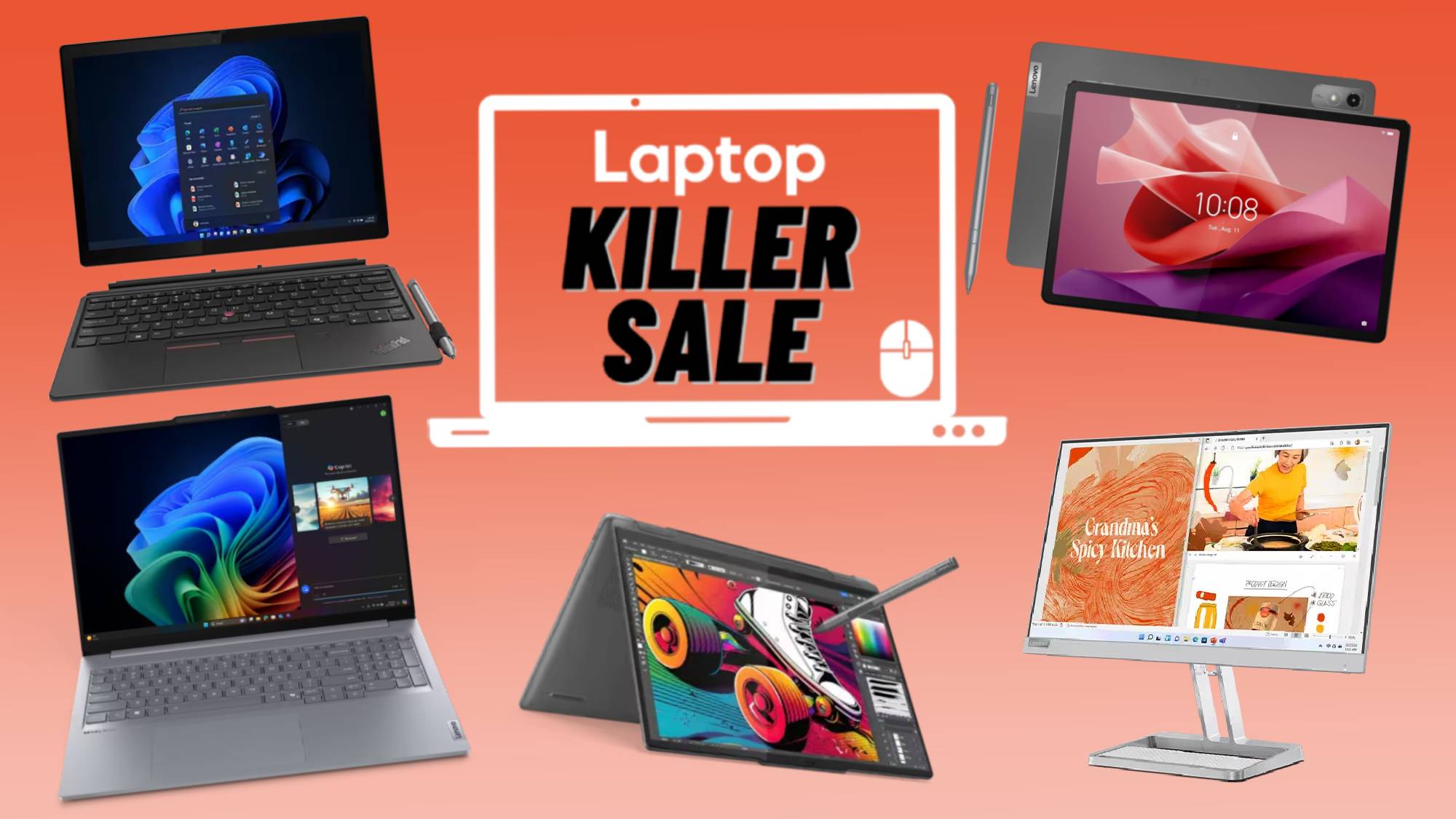Laptop Mag Verdict
The Origin PC Eon17-X delivers great performance for all your gaming, virtual reality and multitasking needs and offers a deep well of customization options.
Pros
- +
Great gaming and overall performance
- +
Stunning 4K, G-Sync display
- +
Attractive design
- +
Comfortable keyboard
- +
Lots of customization options
Cons
- -
Very expensive
- -
Below-average battery life
Why you can trust Laptop Mag
Desktop processors, Pascal GPUs and a stunning display: That's what awesome gaming laptops are made of, and the Origin PC Eon17-SLX is the proof in the proverbial pudding. Priced at $3,682, the 17.3-inch system offers power, speed and beauty with a ridiculous amount of customization options. If you can afford its extremely high price, the Eon17-X is something that has to be seen and played to be believed.
Design
From here on out, I'm calling the Origin Eon17-X "afternoon delight," because it most definitely looks like a skyrocket in flight. Origin PC switched things up a bit, adding a slate-gray, brushed-aluminum panel that separates and accentuates the pair of dark-gray, metal speaker grilles and the rest of the lid, which is made of matte-black plastic. The light gray Origin emblem, reminiscent of a far-flung galaxy, is prominently centered at the top.
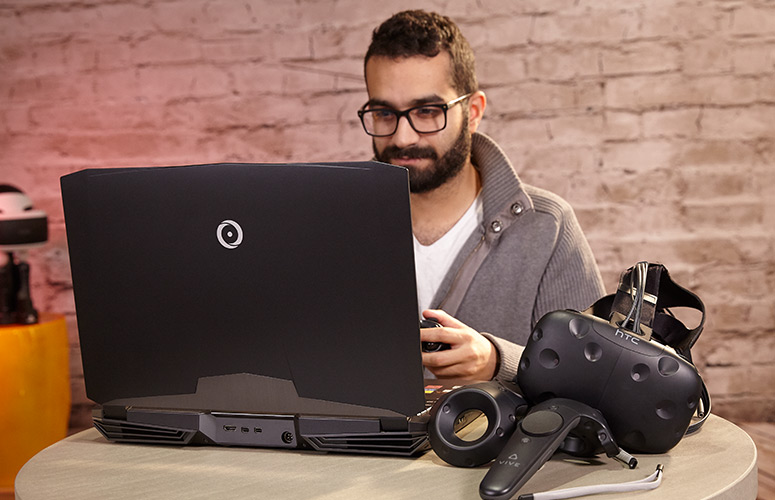
The laptop's interior consists of black matte plastic, which is nice, but a soft-touch finish would have been better. That gray aluminum from the lid also makes an appearance, wrapping over the rear of the notebook to frame the power button and its glossy status-indicator bar. The keyboard resides in a large recess below the power button and above the unassuming touchpad.
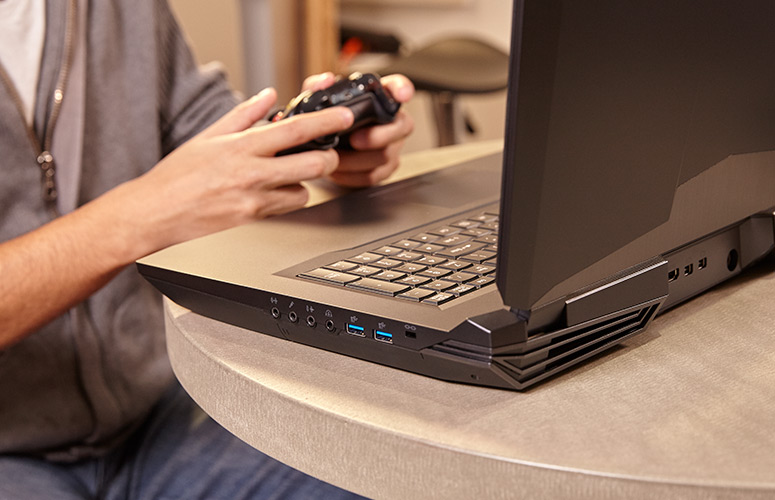
Like any self-respecting gaming battlestation, the Eon17-X has a ton of ports that support several displays, a couple of mice, and an external hard drive or two. There's a pair of USB 3.0 ports on the left with a secure lock slot and jacks for headphones, microphone, audio-out and S/PDIF. On the left, are two more USB 3.0 ports, a USB Type-C port, a Thunderbolt 3, Gigabit Ethernet and a 6-in-1 card reader. Along the system's rear, you'll find a pair of mini DisplayPorts and the power jack.
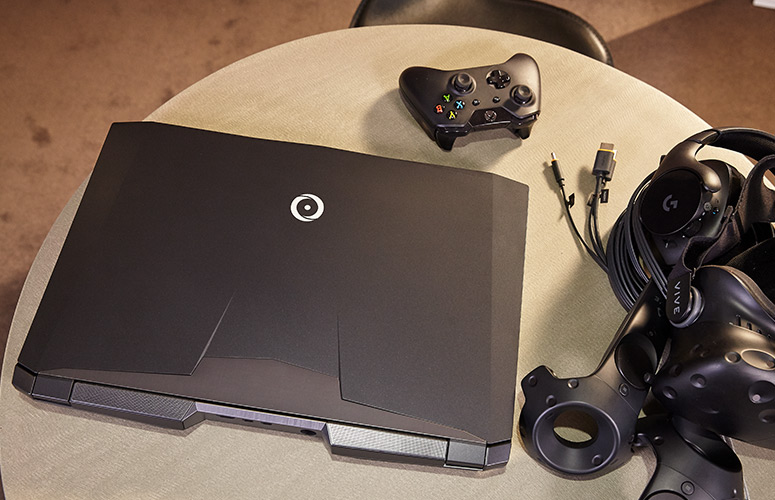
Weighing a hefty 9.8 pounds, the 16.4 x 11.6 x 1.6 inch Eon17-X isn't what I'd call portable. But it's on a par with the Acer Predator 17 X (16.7 x 12.7 x 1.8 inches) and Alienware 17 R4 (16.7 x 13.1 x 1.2 inches), which weigh 9.8 and 9.6 pounds, respectively. The Asus ROG G701VI (16.9 x 12.2 x 1.3 inches) and Razer Blade Pro (16.7 x 11 x 0.88 inches) are noticeably lighter, at 7.9 and 7.8 pounds.
Display
Whoever thinks that matte displays don't have vivid colors clearly hasn't seen the Eon17-X's 17.3-inch, 3840 x 2160 screen. Watching the 4K "Tears of Steel" trailer, I was bombarded by a parade of neon blues and hot pinks juxtaposed against the mundanity of verdant suburbia. Details were so sharp that I could see the gears and servos in the actress's robot hand.
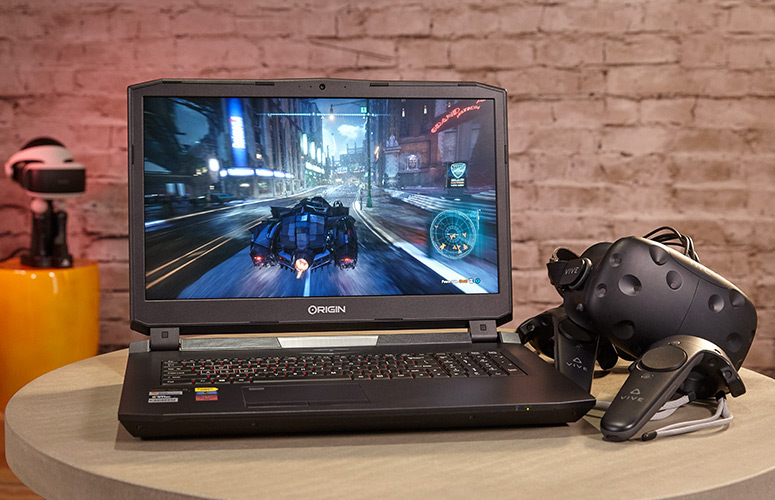
The screen only helped to accentuate the inherent beauty of the Mass Effect: Andromeda universe. As I explored an alien vault, the long-dormant blue structure sprang to life, sending emerald green light pulsing through intricate paths carved into the structures. A mysterious black liquid undulated below, enticing me with its unctuous surface.
The Eon17-X's screen can reproduce an amazing 196 percent of the sRGB gamut, far surpassing the 122-percent desktop-replacement category average. The Blade Pro wasn't too far behind, at 185 percent, while the Predator 17 X delivered 182 percent. The Alienware 17 and G701VI were tied, at 113 percent.
Not only is the Eon17-X's panel incredibly vivid, but it's also very accurate, posting a score of 0.14 during the Delta-E test, in which0 is the ideal. That's much better than the 1.3 average as well as the 2.3, 1.6 and 0.5 achieved by the Blade Pro, G701VI and Alienware 17. The Predator 17 X produced a good score of 0.18.
When we measured for brightness, the Eon17-X stumbled a bit, averaging 289 nits, which is a bit below the 293-nit average, but better than the G701VI, which hit 277 nits. The Eon17-X's score wasn't enough, however, to outshine the Blade (304 nits), Predator 17 (318 nits) or Alienware 17 (340 nits).
In addition to its superhigh resolution, the display also has Nvidia's G-Sync technology built in. That means the laptop's display rate is synchronized with the graphics card, essentially placing a frame cap that matches the panel limit. That makes for near-instant rendering in both full-screen and windowed modes, thus eliminating any tears and leaving smooth images and happy gamers.
Audio
Thanks to the speakers, subwoofer and Creative's Sound Blaster X-Fi MB5 software, the Eon17-X has some kick-ass sound. Loud, detailed and balanced, the laptop sounded amazing whether it was producing the deep, penetrating bass lines on Kendrick Lamar's "Humble" or the tense strings punctuated by the high-pitched whine of a laser rail gun charging before unleashing a torrent of blue-white hell upon my foes.
Keyboard and Touchpad
Typing in the Eon17-X's traditional keyboard is like typing on a bunch of tiny springs. There's even a small click with each key (1.5-millimeter key travel with 73 grams of actuation). I easily hit my 65-word-per-minute average on the 10FastFingers Typing test.
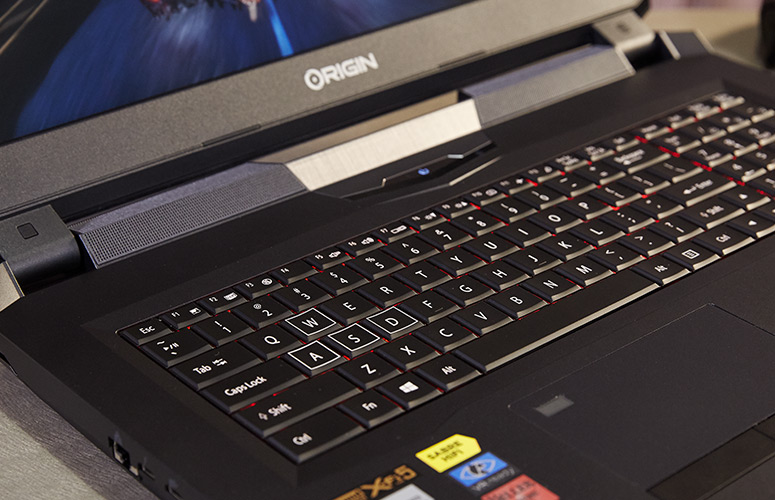
My one gripe with the keyboard is the first-party app used to program Hot Keys and backlighting. Although it gets the job done, it's not as refined as Alienware's AlienFX software, Razer's cloud-based Synapse or even MSI's Dragon Gaming Center. I'd like a better way to select color and a few more effects to boot.
I had plenty of room to perform two-finger scroll and rotate on the 4.2 x 2.4-inch Synaptics touchpad. Whether I used pinch-zoom to enlarge text or launched Cortana with a three-finger tap, the response was fast and responsive.
Origin PC is one of the few manufacturers that give gamers the option of embedding a fingerprint scanner on the touchpad. While playing Mass Effect, Witcher 3 or Hitman isn't a state secret, I like the idea that my game saves and actual work have an extra layer of security between them and prying eyes. The scanner supports Windows Hello and is pretty simple to set up; just tap your finger on the scanner a few times to register the digit, and you're ready to go.
Gaming, Graphics and VR
Go ahead, switch those settings to Ultra and turn on ALL the shaders. The Eon17-X can handle all of that, thanks to its Nvidia GeForce GTX 1080 GPU with 8GB of VRAM. Currently the most powerful mobile graphics chip available, the GTX 1080 will deliver excellent frame rates at 1080p and mixed results on 4K. The GPU is also VR-ready, so feel free to whip out that HTC Vive or Oculus Rift.
The Eon17-X got 11 on the SteamVR Performance test, easily beating the 9.3 desktop-replacement average. Armed with their own GTX 1080 GPUs, The Predator 17 X, Alienware 17, G701VI and Blade Pro also hit 11.
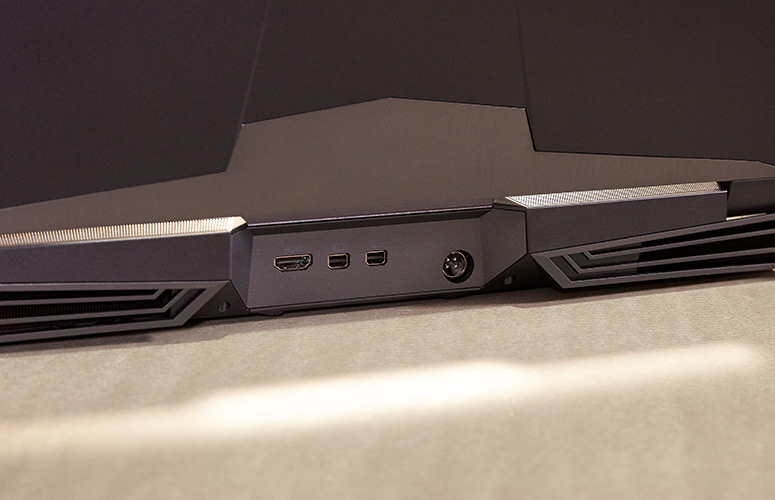
Benchmarks are cool, but actual playtime is better. I had a blast winging glowing purple Spectral Knives at my opponent in The Unspoken. While I was teleporting frantically around the arena, dodging flaming skulls and throwing magical playing cards, the Eon17-X kept pace with the action. Even when I summoned the arena golem and the fighting got really hectic, there was never any slowdown.
The Eon 17-X continued to deliver great performance on our benchmarks, notching 66 fps on the Rise of the Tomb Raider test (1080p on Very High), matching the Predator 17. It beat the 51-fps average as well as the Blade Pro (65 fps) and Alienware 17 (62 fps) but not the G701VI, which got 71 fps.
MORE: The Best Gaming Laptops
When we ran the Hitman benchmark, the Eon17-X produced an excellent 129 fps at 1080p, cruising past the 81-fps average. The Alienware 17 wasn't too far behind, with 110, while the Blade Pro and Predator obtained 103 and 60 fps each. Switching the resolution setting to 4K saw the Eon17-X's frame rate drop to 59 fps, which was just behind the Predator 17's 60 fps. At 1440p, the Alienware 17 achieved 87 fps.
During the Grand Theft Auto V test, the Eon17-X delivered 84 fps, which was enough to top the 73-fps average. The Predator 17, Alienware 17 and Blade Pro scored lower, at 83, 82 and 65 fps, respectively. However, the G701VI managed to secure the lead, with 90 fps.
On the Metro: Last Light benchmark, the Eon17-X got 83 fps, surpassing the 59-fps category average but not the G701VI's score of 90 fps. The Alienware 17 (80 fps), Predator 17 (79 fps) and Blade Pro (65 fps) all scored lower.
Overall Performance
Sure, Origin PC could have slapped a regular old mobile processor in the Eon17-X, but where's the fun in that? Instead, the system has a 4.2-GHz Intel Core i7-7700K desktop CPU with 16GB of RAM, which can be overclocked if you're so inclined. I had 40 open Google Chrome tabs, some of which had live streams, TweetDeck and other resource-sapping material, all while running a system scan in Windows Defender. The Eon17-X never hit any lag and carried on, unbothered by the whole ordeal.
The Eon17-X did equally well on synthetic tests such as Geekbench 4, on which it scored 14,491, beating the 13,250 desktop-replacement average. It also performed better than the Blade Pro (11,702, Intel Core i7-6700HQ CPU) and Alienware 17 (14,154, Intel Core i7-7820HK CPU). Sporting overclocked Intel Core i7-7820HK CPUs, the Predator 17 and G701VI achieved 14,795 and 17,404, respectively.
When we tested File Transfer speeds, the Eon17-X's 512GB NVMe M.2 PCIe SSD (with a 1TB 7,200-rpm hard drive) duplicated 4.97GB of multimedia files in 5 seconds. That translates into a transfer speed of 1,017.9 megabytes per second. That's fast, certainly faster than the 574.2MBps average and the Blade Pro's (dual 256GB PCIe SSD) score of 391.5MBps and the Alienware 17's (512GB SSD) showing of 282MBps. The Predator 17 (dual 256GB PCIe SSD) and G701VI (dual 512GB SSD) got 1,272.3 and 1,272.4MBps.
During the OpenOffice Spreadsheet Macro test, the Eon17-X matched up 20,000 pairs of names and addresses in 3 minutes and 47 seconds. It's slower than the 3:25 average, but better than the Blade Pro's 4:06. The Predator 17, G701VI and Alienware 17 had faster times of 3:41, 2:59 and 1:47.
Battery Life
When you have desktop processors and top-notch GPUs, you're going to pay the price somewhere. In the case of the Eon17-X, you're sacrificing battery life.
MORE: Laptops with the Longest Battery Life
The system lasted only 1 hour and 39 minutes on our battery test, which consists of continuous web surfing over Wi-Fi. That mark is well short of the 4:14 average, but the Eon17-X's competitors did only marginally better. The Predator 17 notched 1:58, while the Blade Pro and Alienware 17 clocked in with 2:45 and 2:46. The G701VI lasted the longest, at 3:27.
Heat
I understand that a system this powerful needs fans to keep things cool, but the ones on the Eon17-X can get a bit distracting. Once I booted up Mass Effect: Andromeda, it sounded like a small turbine was hovering above my desk. Turning the speakers up kills the heavy whirring noises, but in a quiet space, you'll definitely hear the fans.
Loud or not, the fans do what they're supposed to: keep things nice and frosty -- at least, they do so on the top of the device. After 15 minutes of running around Andromeda, the touchpad measured a cool 83 degrees Fahrenheit. The touchpad hit 92 degrees, while the undercarriage blew a hot 119 degrees, which is above our 95-degree comfort threshold. However, you probably wouldn't put this behemoth on your lap.
Once things cooled down, we streamed 15 minutes of a high-definition YouTube video. Everything was at acceptable temperatures, with the touchpad, center and bottom measuring 76, 91 and 86 degrees, respectively.
Webcam
The Eon17-X's integrated 1080p webcam takes color-accurate, but fuzzy pictures and video. It captured the exact shade of my electric-blue shirt as well as the orange of some of the boxes on my desk. But like with most laptop webcams, the detail left much to be desired; visual noise plagued the image, making it difficult to discern any finer details.
Software and Warranty
Thankfully, Origin PC didn't bog the Eon17-X down with a ton of unnecessary bloatware. There is some, including Sling, Twitter and Facebook, but it's nowhere near what you'd find on other systems.
Useful software includes Nvidia GeForce Experience, which has several game-centric apps such as Game Optimization and ShadowPlay for live-streaming. You also get Killer Networking, so you can prioritize network bandwidth. Finally, there's DataColor's Spyder4Elite software, which lets you calibrate the color on the display.
Origin PC ships the Eon17-X with lifetime 24/7 support, lifetime free labor, one-year part replacement and a 45-day shipping warranty.
Configurations
I had a blast saving the galaxy on the $3,577 configuration of the Eon17-X, which is jam-packed with high-end specs, including a 4.2-GHz Intel Core i7-7700K desktop CPU with 16GB of RAM, 512GB NVMe M.2 PCIe SSD with a 1TB 7,200-rpm hard drive, Nvidia GeForce GTX 1080 GPU with 8GB of VRAM and a 3840 x 2160 Nvidia G-Sync display.
The $1,883 base model has a 4.2-GHz Intel Core i3-7350K desktop processor, 8GB of RAM, a 250GB SSD, an Nvidia GeForce GTX 1060 GPU with 6GB of VRAM and a 1920 x 1080 G-Sync display.
When it comes to customization, Origin PC is king. From laptop chassis to fingerprint readers, you can tweak just about everything about your new laptop. You can choose from five different CPUs, three GPUS and a whopping 35 RAM options, just to name a few of your options. The company also offers overclocking and screen-calibration services. Just keep in mind that creating the gaming system of your dreams can quickly add up. One minute you're buying a laptop, and the next you're forking out enough dough for a down payment on a car.
Bottom Line
Damn, Origin PC does it again. The Eon17-X has an all-star cast of specs, including a desktop Core i7 processor, an Nvidia GTX 1080 GPU and an incredibly vivid display that's been enhanced with Nvidia's G-Sync technology. Toss in a crazy-fast PCIe SSD, and you've got a certified winner. That's before you start tinkering with Origin PC's extensive list of customizations. Want a blue metallic laptop with a color-calibrated display, an overclocked processor, 64GB of RAM and a pair of 2TB SSDs in RAID configuration? Go ahead, but it's going to cost you. As it stands, many users will find the $3,682 version of the system out of financial reach.
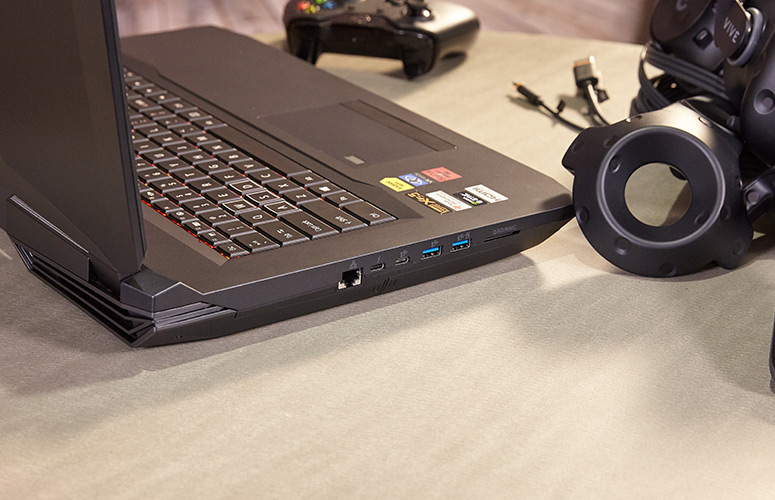
For $2,999, you can get the Acer Predator 17 X, which is every bit the powerhouse the Eon17-X is, and in some cases, more so. However, you'll lose out on the customization options. But if you're looking for pie-in-the-sky levels of performance and ostentatiousness, the Eon17-X can't be beat.
Origin Eon 17-X Specs
| Bluetooth | Bluetooth 4.1 |
| Brand | Origin |
| CPU | 4.2-GHz Intel Core i7-7700K processor |
| Card Slots | 6-1 card reader |
| Company Website | www.originpc.com |
| Display Size | 17.3 |
| Graphics Card | Nvidia GeForce GTX 1080 GPU |
| Hard Drive Size | 512GB |
| Hard Drive Speed | n/a |
| Hard Drive Type | NVMe M.2 PCI-e SSD |
| Highest Available Resolution | 3840 x 2160 |
| Native Resolution | 3840 x 2160 |
| Operating System | Windows 10 Home |
| Optical Drive | None |
| Optical Drive Speed | n/a |
| Ports (excluding USB) | HDMI 2.0, USB 3.0, Gigabit Ethernet, Thunderbolt 3, Audio-out, S/PDIF, Audio-in, Mini DisplayPort, Microphone, security lock slot, Headphone, USB Type-C |
| RAM | 16GB |
| RAM Upgradable to | 64GB |
| Secondary Hard Drive Size | 1TB |
| Secondary Hard Drive Speed | 7,200 |
| Secondary Hard Drive Type | HDD |
| Size | 16.4 x 11.6 x 1.6 inches |
| Touchpad Size | 4.2 x 2.4 inches |
| USB Ports | 6 |
| Video Memory | 8GB |
| Warranty/Support | Lifetime 24/7 U.S. Based Support and Lifetime Free Labor. 1 Year Part Replacement & 45 Day Shipping Warranty |
| Weight | 9.8 pounds |
| Wi-Fi | 802.11ac |
| Wi-Fi Model | Killer Wireless-n/a/ac 1535 Wireless Network Adapter |

Sherri L. Smith has been cranking out product reviews for Laptopmag.com since 2011. In that time, she's reviewed more than her share of laptops, tablets, smartphones and everything in between. The resident gamer and audio junkie, Sherri was previously a managing editor for Black Web 2.0 and contributed to BET.Com and Popgadget.
